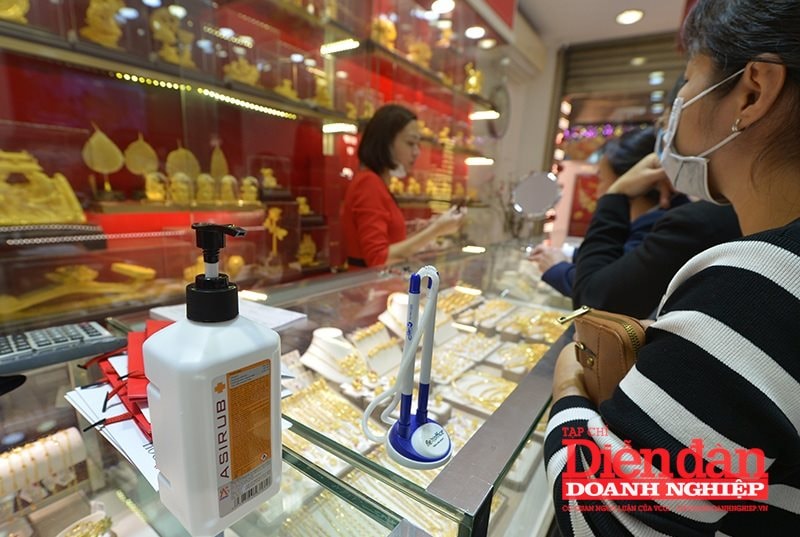Will Decree No 232/2025 help "cool down" the Vietnam gold market?
Amidst the ongoing surge in gold prices, the Vietnamese government's issuance of Decree No. 232/2025/NĐ-CP has raised hopes—particularly in terms of cooling down the overheated gold market.

The Government issues Decree No. 232/2025/NĐ-CP amending Decree No. 24/2012/NĐ-CP on gold trading management – Photo: Quoc Tuan
On August 26, 2025, the Government issued Decree No. 232/2025/NĐ-CP amending and supplementing several articles of Decree No. 24/2012/NĐ-CP dated April 3, 2012, on the management of gold trading activities.
One of the key provisions in this decree is the abolishment of Clause 3, Article 4 of Decree 24/2012/NĐ-CP, which removes the State's monopoly over the production of gold bullion, and the import/export of raw gold for bullion manufacturing.
Additionally, all gold purchases or sales worth 20 million VND or more per customer per day must now be processed through customer payment accounts and business accounts opened at commercial banks or foreign bank branches.
With gold prices continuously setting new records, this decree is expected to help control and stabilize prices, increasing transparency in gold trading. But the question remains: Will this truly help cool down the gold market?
According to economic expert Associate Professor Dr. Nguyễn Thường Lạng, whether domestic gold prices will drop following the removal of the State monopoly on bullion production remains to be seen, as many influencing factors are at play. However, lifting the monopoly could increase supply beyond a certain threshold, allowing gold suppliers to operate more freely and on equal footing.
Ultimately, this aims to safeguard citizens’ legitimate rights to buy, sell, and store gold; stabilize the gold market; and maintain macroeconomic stability.
Mr. Nguyễn Quang Huy, CEO of the Faculty of Finance and Banking at Nguyễn Trãi University, commented that Decree 232/2025/NĐ-CP represents more than a technical legal adjustment—it strategically reshapes the market structure, promotes competition, enhances transparency, and aligns with international standards.
“The removal of monopoly does not mean deregulation. It signifies a shift from a single centralized model to a multi-stakeholder framework still under centralized supervision. The greatest benefit lies in diversifying supply, easing scarcity, and encouraging competition in price, services, and branding,” Huy noted.
He further emphasized that under the new decree, only enterprises with charter capital of at least 1 trillion VND are eligible to produce gold bullion. This means the main playing field is effectively reserved for large enterprises. Smaller businesses will lose access to high-liquidity segments but can pivot toward jewelry and fine gold products or become official distributors for major firms. They could also expand into gold-related financial services such as pledging, safekeeping, and collateral lending.

The newly issued decree raises high hopes – Photo: Quoc Tuan
For firms with over 1 trillion VND in charter capital—aside from SJC—this decree presents a long-awaited opportunity to enter the bullion market, which has long been protected. These new entrants are financially strong and capable of building competitive counterbalances. Their advantages include robust capital, modern management, and strategic long-term planning.
However, Huy cautioned that this presents a significant challenge: public trust in SJC-branded gold has been built over many years. Changing consumer habits will require patience, transparency, and a commitment to two-way buying and selling to ensure lasting liquidity.
For SJC, the changes are a double-edged sword. While the brand enjoys unmatched recognition and consumer trust—intangible assets that are hard to replicate—the loss of monopoly will force the company into genuine competition, potentially narrowing profit margins. To maintain leadership, SJC must innovate, upgrade gold verification technologies, develop gold-related financial products, and expand its distribution network. If it relies solely on past advantages, its market share may gradually erode.
“The entry of financially and managerially capable players will make the market more transparent and aligned with global price movements, reducing the current huge price gaps. However, due to strict licensing conditions, only a handful of large enterprises will likely qualify—creating a selective competition mechanism. While it won’t be an absolute monopoly, it also avoids excessive fragmentation,” Huy emphasized.
Amid historically high domestic gold prices and a nearly 20 million VND/lượng gap between SJC and global gold prices, the issuance of Decree 232/2025/NĐ-CP is considered a positive signal—one that could help relieve pressure on the market.








